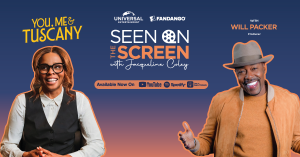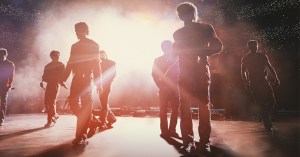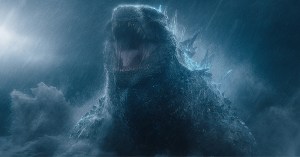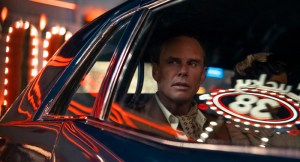John Hawkes’ Five Favorite FIlms
On screen, John Hawkes is something of a chameleon, looking completely at home on the dusty, swear-heavy roads of Deadwood, the raging seas of The Perfect Storm, the snowy fields of Winter’s Bone, or the emotionally complicated modern world of Me You and Everyone We Know. His beginnings in a rural community, as he points out a couple of times in this interview, got him used to the certain kinds of classic films that were readily available to him, and later set him up for some memorable experiences with different kinds of art. His list has both, and he would like for it to be known that he could easily pick five completely different films if I were to return in five more minutes and ask again, which I would have happily done.
The Wizard of Oz (Victor Fleming, King Vidor, 1939; 99% Tomatometer)
I grew up in a rural area and with four channels on a black and white TV. Birdman of Alcatraz would come on TV, anything with Don Knotts, like The Incredible Mr. Limpet, but Wizard of Oz was a big deal. That movie came on a couple times a year and as a little kid, as all kids are, I was pretty skeeved out by the flying monkeys. But I got past that and just really, really loved the film. I think that I related to the fantastical story as a whole, and also to the idea of being in a rural area and wondering what else is out there — what’s on the other side of the rainbow, so to speak. It was formative.
When I was 19, I moved to Austin, Texas, and I went to the Varsity theater — rest in peace, Varsity theater — and saw the movie as an adult. When they’re in Oz and it’s suddenly color, I gasped, because I only had a black and white TV, and in the back of my head I knew the movie turned to color, but I had forgotten. That was a really wonderful surprise. Also, seeing it on a big screen made the movie that much more of a great gift.
It’s a Wonderful Life (Frank Capra, 1946; 94% Tomatometer)
It’s corny but dark, dark, dark in spots. It was really dark when Jimmy Stewart is having his existential breakdown, wandering the town, having been given a chance to see what the world would be like had he not been there. We all kind of wonder that on some level — if not consciously, it’s probably part of what’s inside us. Something that is interesting about that film, there’s a character actor named H.B. Warner — he’s in all Capra films, playing a wide variety of roles. In this one, he plays the drunken druggist Mr. Gower. There’s a scene early on where Jimmy Stewart’s not even in the film yet. Young George has injured his ear in a sledding accident and Mr. Gower, drunk and depressed, accidentally sends George out with a prescription of poison to give a patient. When he figures it out and goes back, Mr. Gower is incensed, and beats him savagely. He hits him in the ear, and then when Mr. Gower realizes that the kid has saved this woman’s life and come back and he’s made a horrible mistake, he tries to embrace the boy. The boy’s fighting and the druggist is trying to comfort him, and himself at the same time. It’s a scene that if I think too hard about it, I’ll weep. It’s such a beautiful moment between two human beings. The kid was a great kid actor, but H.B. Warner is such a master, and I relate to character actors in a lot of ways. He was this guy who just bounced around from project to project, making everything he does, every story, richer for his presence. I have a lot of respect for that.
Harold and Maude (Hal Ashby, 1971; 86% Tomatometer)
This was a life changing experience for me. I went to one year of college at a small college in Minnesota, and during that year I befriended an older student named Tim Streeter who I hung out with a lot. He played Tom Waits for me and handed me On The Road by Jack Kerouac. Since I’m from this small farming community, I wasn’t exposed to a lot of unusual art. I had seen The Seventh Seal when I was a kid on PBS.
One night [Tim Streeter] said “There’s a movie playing at the student union and you should go.” It was Harold and Maude, and I was amazed by it. There’s no dialogue for the beginning of the film, and it begins with Harold killing himself. His mother berates him for it. Bud Cort’s performance is so great, that this is when I began to become a Hal Ashby fan. I could name his films as all of my Five Favorites if I wanted. Being There is certainly near the top.
I chose this one because it was so formative for me. Ruth Gordon, when she tells Harold to go out and love and have experience and give him something to talk about in the locker room, it’s such a great thing, such a beautiful moment.
When Ruth Gordon throws the ring or piece of jewelry that Harold’s given to her, and she said, “Now I’ll always know where it is,” I think it’s in that scene where the camera catches a concentration camp number on her wrist that’s never mentioned or talked about. It gives me chills because it’s so affecting and subtle.
Stranger Than Paradise (Jim Jarmusch, 1984; 95% Tomatometer)
Jim Jarmusch film. So wonderfully done in black and white. John Lurie stars and does the music. It’s weird because there are no close ups in the film, it’s an objective viewing experience, and yet it’s subjective in the way that Jarmusch points you. You’re given anything to look at, but you’re always looking at the right things. And the idea that it began as a short, just called The New World, but they raised money to make the other two or three acts, is really interesting to me. Great performances, a lot of humor, really slow pace. These were things I wasn’t really used to — the European pace, even though I love The 400 Blows, it was a revelation at the time in 1984. And I saw it when it came out in Austin, and just I think it opened up a new world of storytelling and filmmaking to me on some level.
The Big Lebowski (WJoel Coen, Ethan Coen, 1998; 80% Tomatometer)
I could go with Shadow of a Doubt, any number of Woody Allen movies, Paul Thomas Anderson, Wes Anderson — The Royal Tenenbaums I love — but I’m going to go with The Big Lebowski because it’s such a fully realized, beautiful film. John Goodman is amazing, [John] Turturro, [Steve] Buscemi, Sam Elliot — and then Jeff Bridges was fantastic. Julianne Moore. Just really, really, really, really such a satisfying film to watch, and so quotable, and something that I could have on a loop 24 hours a day in my home and never be bored with. Fantastic film. I’ll say no more.
Life of Crime opens Aug. 29 in select theaters.
Click here for more Five Favorite Films.







